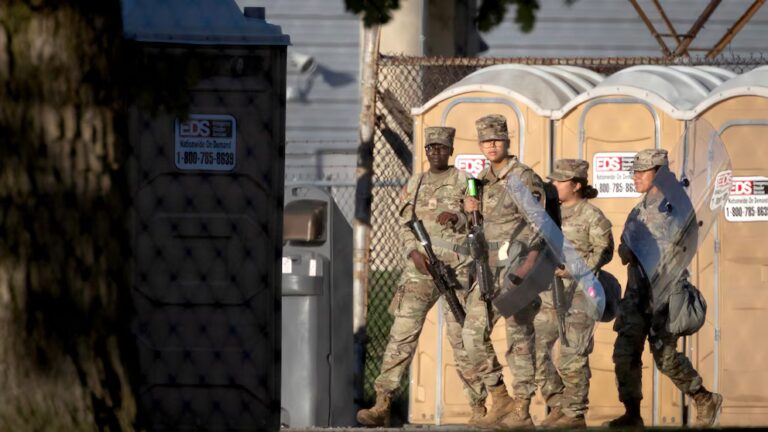
As the United States escalates tensions with Iran, House Democrats are sending President Donald Trump a message: If he wants to take any military action, he has to get permission from Congress first.
The House voted Wednesday to repeal the 2001 Authorization for Use of Military Force (AUMF), which was passed in the days after 9/11, and gave President George W. Bush the authority to go to war with al-Qaeda and any related organization. For the past 18 years, presidents of both parties have used this same 2001 congressional war authorization as justification for wars all over the Middle East.
The vote is particularly significant now, as Trump administration officials briefed Congress Wednesday on what they said are connections between Iran and al-Qaeda. Trump’s administration has been escalating tensions with Iran, leading to mounting concern on Capitol Hill that the administration is itching for war.
This week, the United States announced plans to send an additional 1,000 troops to the Middle East to counter Iran, after blaming the country for attacking oil tankers that belonged to Saudi Arabia, the United Arab Emirates, Japan, and Norway. Iran denies any involvement in the attacks. The Trump administration has called an Iranian strike on Americans in the Middle East “imminent,” and Iran has indicated that it may stop abiding by the 2015 nuclear arms deal (which Trump removed the United States from in 2018).
This is the first time the House has successfully passed a repeal of the 2001 AUMF since it was enacted. The provision was attached to a government funding bill for the Departments of Defense, Labor, Health and Human Services, and Education. It was an amendment brought forward by Rep. Barbara Lee (D-CA), who notably was the only House lawmaker to vote against the war authorization in 2001 — a decision some have hailed as prescient.
This bill is unlikely to go anywhere in the Senate, where Republicans led by Majority Leader Mitch McConnell hold the power. No House Republicans voted for the funding bill. That said, a bipartisan group of lawmakers has fought against Trump on war powers already once this year — over the war in Yemen.
And there are already rumblings that the same coalition is ready to take a stand on Iran.
Congress has been fighting Trump on war powers
Secretary of State Mike Pompeo and Trump’s administration have been notably vague about whether they have plans to use the 2001 war authorization to launch military action against Iran. Asked about it on CBS Sunday, Pompeo said “we always have the authorization to defend American interests,” but wouldn’t say if he was confident the 2001 AUMF would allow for the executive branch to launch military action in Iran.
But members of Congress, both Republican and Democrat, have been increasingly wary of ceding war powers — which under the Constitution is granted to Congress — to the executive branch.
In April, Congress passed a historic War Powers Resolution, led by Sens. Bernie Sanders (I-VT) and Rep. Ro Khanna (D-CA) directing Trump to remove troops involved in “hostilities” in Yemen, a Saudi-led war that’s killed more than 50,000 and left tens of millions in need of humanitarian aid. Trump vetoed it, citing his commitment to the US’s long-standing alliance with the Saudis.
Since then, Trump has escalated tensions with Iran and sidestepped Congress to unilaterally authorize $8 billion in arms sales, including to Saudi Arabia and its allies. It’s prompted a show of bipartisanship in Congress.
In April, a group of bipartisan senators led by Sens. Tom Udall (D-NM), Rand Paul (R-KY), and Dick Durbin (D-IL) introduced the Prevention of Unconstitutional War with Iran Act of 2019, which would require Trump seek authorization from Congress before beginning any military engagements with the country.
In March, Sens. Tim Kaine (D-VA) and Todd Young (R-IN) introduced a bipartisan bill to repeal the 1991 and 2002 war authorizations against Iraq.
More recently, Young (R-IN) and Chris Murphy (D-CT), both members of the Senate Foreign Relations Committee, announced a bill aimed at forcing legislators to vote on sending weapons and military aid to Saudi Arabia.
And in the House, Reps. Thomas Massie (R-KY) and Andy Levin (D-MI) have brought up the AUMF Clarification Act, to make clear that the Trump administration can use neither the 2001 AUMF nor the 2002 Iraq AUMF in order to justify military action in Iran.
For now, the Trump administration is being tight-lipped about its specific plans in the Middle East. But members of Congress have a long list of war powers proposals at the ready, and seem prepared to work across to aisle to ensure the president cannot unilaterally decide to start a conflict with Iran.
Sourse: vox.com






